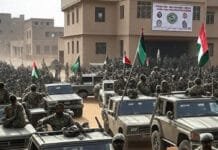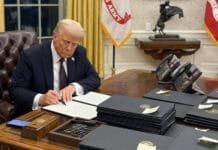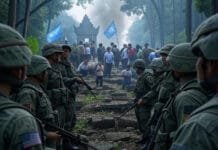In a critical development on the Southeast Asian geopolitical landscape, Cambodia’s Prime Minister Hun Manet has officially declared a ceasefire in the intensifying border dispute with Thailand. The announcement comes following days of heavy cross-border shelling and gunfire that have claimed 33 lives, predominantly civilian casualties. The breakthrough was achieved through international mediation, with China and the United States playing pivotal roles in brokering the truce.
Historic Peace Talks in Kuala Lumpur Signal Shift in Bilateral Relations
The ceasefire agreement was the result of high-level diplomatic talks held today in Kuala Lumpur, the capital of Malaysia. Prime Minister Hun Manet of Cambodia and Acting Prime Minister Phumtham Vechayachai of Thailand met face-to-face under the auspices of Malaysian Prime Minister Anwar Ibrahim, who chaired the dialogue. The presence of both regional stakeholders and global superpowers at the negotiation table underscores the strategic importance of preventing further destabilization in the Indochinese Peninsula.
These talks, supported logistically and diplomatically by Beijing and Washington, mark the first direct bilateral engagement between the two nations since violence flared earlier this month.
Border Dispute Sparks Deadly Violence
The Cambodia–Thailand border has long been a flashpoint of contention, rooted in historical disagreements over demarcation, particularly near the Preah Vihear temple, a UNESCO World Heritage Site located in a heavily militarized zone. The recent escalation began with disputed military maneuvers, with both sides accusing the other of unauthorized encroachments.
Over the past week, border villages and military checkpoints became battlegrounds. According to initial assessments, 33 people, mostly non-combatant villagers including women and children, lost their lives. Dozens more were injured or displaced, with reports of mass civilian evacuations along the contested frontier.
Hun Manet’s Statement: A Call for Peace
In a televised national address, Prime Minister Hun Manet stated:
“We are committed to halting the violence and preserving peace for the sake of our people. There is hope of stopping the fighting immediately, and we urge Thailand to work with us to de-escalate tensions.”
Hun Manet emphasized the humanitarian costs of the conflict and extended condolences to the victims’ families. He called the ceasefire “a necessary first step” toward long-term stability and reconciliation.
Thailand Responds with Cautious Optimism
Acting Thai Prime Minister Phumtham Vechayachai echoed similar sentiments in a joint statement after the Kuala Lumpur summit.
“Thailand welcomes this ceasefire. We are committed to ensuring the safety of civilians and engaging in further peace-building steps. Dialogue, not bullets, will define our future.”
While military units along the border remain on high alert, Thailand’s government has initiated coordination with ASEAN observers to monitor compliance and prevent further skirmishes.
Role of International Mediators: China and the U.S. in Focus
China and the United States have emerged as unlikely collaborators in resolving the Cambodia–Thailand dispute. Both powers sent special envoys to Malaysia, demonstrating a rare alignment of interest in maintaining regional peace and stability.
China’s foreign ministry issued a statement lauding the outcome:
“Peace is in the interest of all nations in Asia. We support the sovereignty of both Cambodia and Thailand and encourage peaceful conflict resolution mechanisms.”
Meanwhile, the U.S. Department of State underscored its support for “ASEAN-led diplomacy,” calling the ceasefire a “positive step toward deconfliction and humanitarian relief.”
Civilians Bear the Brunt of the Conflict
The border clashes over the past week have exacted a heavy toll on civilians. Entire families were displaced in Oddar Meanchey province on the Cambodian side and Sisaket province in northeastern Thailand. Reports from humanitarian agencies indicate over 5,000 people have sought shelter in temporary camps.
Local residents describe scenes of panic, with artillery shells damaging homes and disrupting power supplies. “We never expected the army to fight so close to our fields,” said Sophal Chea, a Cambodian farmer. “We left everything behind and just ran.”
Humanitarian organizations, including the International Red Cross and UNHCR, have mobilized to deliver emergency aid, water, food, and medical care to the affected population.
Military Activity to Be Closely Monitored
Under the ceasefire terms, both nations have agreed to halt all offensive operations, pull back troop deployments from contested areas, and initiate a joint demarcation review. The United Nations is expected to dispatch military observers to oversee compliance, while ASEAN has offered to establish a permanent monitoring task force.
Both sides have also committed to maintaining open lines of communication through their respective defense ministries, with a bilateral crisis hotline activated as a safeguard against potential misunderstandings.
Geopolitical Implications of the Ceasefire
This ceasefire is not just a bilateral victory — it is a geopolitical signal. The ability of China and the U.S. to coordinate on a sensitive regional issue may set a new precedent for cooperative diplomacy in Asia. Furthermore, Malaysia’s diplomatic success enhances its role as a neutral peace facilitator within ASEAN.
The ceasefire also affects the regional balance of power, as both Cambodia and Thailand are seen as key strategic nodes in larger Indo-Pacific dynamics, especially amid increasing maritime tensions and trade realignments.
Future Steps: Toward Sustainable Peace
Moving forward, both governments have agreed to convene another round of peace talks in Phnom Penh within the next 30 days. These discussions will focus on:
Formalizing border demarcation lines
Implementing a de-militarized zone
Establishing joint economic zones
Ensuring long-term conflict resolution mechanisms
Regional observers note that the success of this ceasefire depends on sustained political will and civil-society engagement. Both nations are being watched closely by ASEAN, the UN, and international watchdogs.
Conclusion: A Fragile But Vital Ceasefire
The ceasefire between Cambodia and Thailand marks a pivotal moment in Southeast Asian diplomacy. While the situation remains delicate, the joint commitment to peace, coupled with international mediation, has opened a critical window for de-escalation. The suffering of civilians, however, serves as a stark reminder of the costs of unresolved territorial disputes.
As we monitor the aftermath and implementation of this agreement, one truth stands clear: regional peace cannot be postponed. Cambodia and Thailand now face a shared opportunity — and responsibility — to turn the page on violence and forge a path toward coexistence, cooperation, and stability.
















